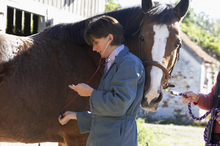Summer is here and with it, cases of horse diseases are increasing. West Nile Virus (WNV) has been diagnosed in Colorado in two counties â Alamosa and Boulder. These cases have been recently diagnosed by Colorado State University Veterinary Diagnostic Laboratory (CSUVDL) in Fort Collins. Neither of the horses were vaccinated for WNV.

To prevent diseases in horses - Vaccinate!
West Nile virus has been diagnosed in Colorado in Alamosa and Boulder counties in unvaccinated horses and, in Texas, five new cases of Eastern equine encephalitis have been confirmed.
West Nile virus is a mosquito-borne zoonotic disease that affects both horses and humans and is transmitted from birds, often referred to as avian reservoir hosts, by mosquitoes, and infrequently by other bloodsucking insects, to horses, humans and a number of other mammals.
Horses and humans are considered to be dead-end hosts for West Nile Virus because the virus is not directly contagious from horse to horse or horse to human, and indirect transmission via mosquitoes from infected horses is highly unlikely as these horses do not circulate a significant amount of virus in their blood.
Vaccination against the West Nile virus is the best method of prevention. A USDA licensed vaccine is recommended as a core vaccine and is an essential standard of care for all horses in North America.
The case fatality rate for horses exhibiting clinical signs of WNV infection is approximately 33%. Data have supported that 40% of horses that survive the acute illness caused by WNV still exhibit residual effects, such as gait and behavioral abnormalities, 6-months post-diagnosis.
In addition, the Texas Animal Health Commission (TAHC) recently received confirmation from the Texas A&M Veterinary Medical Diagnostic Laboratory (TVMDL) of Texas horses testing positive for Eastern Equine Encephalitis (EEE). The infected horses are located in: Newton, Orange, Liberty, Jasper and Jefferson counties. To date, there are a total of five positive EEE cases in Texas.
EEE virus attacks the central nervous system and unvaccinated horses are very susceptible to the infection. The disease appears within five days after a mosquito transmits the virus to the horse. Onset of clinical symptoms are abrupt and infected horses often die within three days.
The fatality rate is 90% or higher and an animal that survives the disease may have brain damage.
Annual vaccination of all horses and other equines is recommended. Horses vaccinated for the first time must receive an injection of EEE-WEE combined vaccine, followed by a second dose three to four weeks later.
The two-dose series is necessary to establish an effective immune response. If an outbreak occurs in the area, a second booster is advised.
Foals should be vaccinated at 4, 5, and 6 months of age for a total of three doses. Another booster should be given in six months and annually from then on.
In addition to making sure that all equines are vaccinated, horses should be taken in at times when the mosquito population is highest. This usually includes the hours around dawn and dusk. In some cases, horses can be blanketed or covered with protective gear to prevent bites. Insect repellant can be used on horses to prevent bites from mosquitoes.
